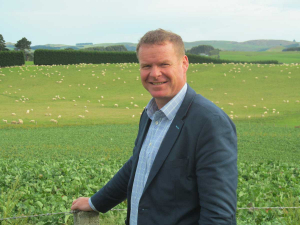Fonterra’s exit from Australia ‘a major event’
Fonterra’s impending exit from the Australian dairy industry is a major event but the story doesn’t change too much for farmers.
 Rabobank New Zealand chief executive Todd Charteris says farmers with a pessimistic outlook cited government policy as a key reason.
Rabobank New Zealand chief executive Todd Charteris says farmers with a pessimistic outlook cited government policy as a key reason.
Government policies and the ongoing fallout from Covid-19 are being blamed for a continuing drop in farmer confidence.
According to the latest Rabobank Farmer Confidence Survey, New Zealand farmer confidence remains deep in negative territory, with significantly more farmers pessimistic than optimistic about the year ahead.
“After staging a strong recovery last quarter from historic lows recorded early in the year, New Zealand farmer confidence has reversed course again, sliding deeper into negative territory,” says Rabobank New Zealand chief executive Todd Charteris.
The quarterly survey – taken during September – found farmer confidence across NZ fell to -32% down from -26% previously. It also discovered that more farmers are now expecting the rural economy to deteriorate during the next 12 months.
It points out that the chief contributor to the lower confidence reading was markedly lower sheep and beef farmer sentiment, negating higher confidence levels reported among both dairy farmers and horticulturalists. Rabobank says this negative sentiment is driven by lingering concerns over government policy and the on-going impacts of Covid-19.
“More than half of all sheep and beef farmers with a pessimistic outlook cited government policy as a key reason for concern, with many likely to be worried about the potential for freshwater regulations announced in late May to negatively impact their operations,” Charteris added.
While sheep and beef farmers were more pessimistic, the survey found dairy farmers and horticulturalists more upbeat about the fortunes of the agricultural economy. Improving demand was the key reason for optimism among both dairy farmers and growers – cited by 45% of dairy farmers and 92% of horticulturalists who had a positive outlook on the year ahead.
However, while confidence in the broader economy lifted among dairy farmers and growers, Charteris said there were still more farmers in both those sectors adopting a pessimistic stance over an optimistic one.
“As with their sheep and beef counterparts, pessimistic dairy farmers cited government policy and Covid-19 as the most two most pressing concerns for the ag economy, while horticulturalists identified overseas markets as their major source of apprehension.”
Former Fonterra executive Alex Turnbull has been appointed CEO to lead all five Yili Oceania Business Division companies in New Zealand.
Fonterra executive René Dedoncker is leaving the co-operative later this year to lead Australian agribusiness Elders.
Alliance Group and the Southland Stags rugby team have joined forces in a partnership that will see the the meat co-operative's farmgate brand feature on players' team kits and replica jerseys.
Fonterra's plan to expand its organic programme to the South Island is being well received by farmers, the co-op says.
Voting has started for the renewal of DairyNZ's milksolids levy.
The most successful catchment groups in NZ are those that have 'a source to sea' approach.

OPINION: Here w go: the election date is set for November 7 and the politicians are out of the gate…
OPINION: ECan data was released a few days ago showing Canterbury farmers have made “giant strides on environmental performance”.